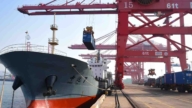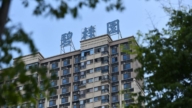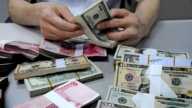【新唐人2014年03月18日讯】从17号开始,人民币兑美元汇率的浮动区间,由1%扩大到2%。中共当局宣称,这个政策是为了让人民币汇率迈向市场化,但有分析指出,中共是迫于国际压力,才不得不放松管控,也有专家质疑,中共此举背后有其他的动机。
自今年2月中旬以来,人民币兑美元汇率出现多次暴跌,而后出现短暂反弹的震荡下跌趋势。今年初至今,人民币兑美元贬值已达1.6%。
3月15号,中国人民银行宣布,从17号起,银行间即期外汇市场人民币兑美元交易价浮动幅度由1%扩大至2%。公告声称,这是“为顺应市场发展的要求,加大市场决定汇率的力度,建立以市场供求为基础、有管理的浮动汇率制度。”
据了解,中共上一次松绑人民币汇率波幅是在2012年4月16号,当时将汇率双向波幅由0.5%放宽到1%。
美国南卡罗来纳大学经济学教授谢田:“它控制受到很多批评,贸易伙伴都要求中国放松这种控制,不要施加人为的操纵。中共受到压力,它就开始放宽,允许在一个小的区间里浮动,但是还是在控制。原来它不让你任意真正的浮动,而现在你在一个小的区间里浮动,原来是很小的区间,现在把区间稍微放宽一点,那还是控制。”
旅美中国社会问题研究人士张健:“中国银行这一次把外汇放宽到百分之二,这当然足以证明,中国目前的钱荒的确是出现了很多问题。搞这个事情一方面可能能解燃眉之急,但是这个政策还是饮鸩止渴,因为中国的经济走入死胡同以后,完全靠头疼医头的模式是不能解决问题的。”
有报导说,中共当局是因为担心国际热钱大规模流入或者流出中国市场,会影响宏观经济,因此一直控制着人民币兑美元的汇率。
对此,美国南卡罗来纳大学经济学教授谢田透露,所谓的热钱主要是来自外逃的资金。
谢田:“中共内部完全可以内线操作、内线交易,中共既得利益集团它一买一卖,就可以赚大钱。控制汇率就有可能鼓励热钱流进来或流出去,就是利用利差来赚钱。中国的热钱,是中共贪官自己的钱,它已经逃出国外了,现在以海外资本名义去中国套利。”
大陆财经评论人士“牛刀”,日前发表一篇文章指出,今年1月份数据出来,人民币存款流失9402亿元,那很容易的解释就是房价见顶,投资人卖掉房子,接盘的人取出存款买房,这种现象是爆发金融危机的前兆,因为最后的接盘人就是为泡沫最后的买单人。而人民币的随后大跌,是因为这么巨额的资金不再存入银行,而是换成美元流出中国。
据《路透社》报导,中共当局决定扩大人民币即期汇率浮动幅度,引发了国外企业和投资者对人民币及中国经济的担忧。报导说,尽管这是2005年中国汇改以来,人民币对美元汇率波幅第三次扩大。但与以往不同的是,国外投资者不敢再像前两次那样,一如既往的单边押注人民币升值,市场比以往更加担心中国经济下行压力究竟有多大,尤其2月出口暴跌18%,制造业采购经理指数滑落至8个月以来最低点,反映出中国经济进一步放缓。
报导说,投资者也猜测中共扩大人民币兑美元汇率的浮动区间,背后是否有其他动机。纽约“梅隆银行”的市场策略师Michael Woolfolk对今年人民币贬值感到震惊,他向《路透社》表示,怀疑当前中国显露出的趋势逆转,是否是中共当局精心策划的结果。
丹斯克银行(Danske Bank )新兴市场首席分析师Lars Christensen,他也质疑中共此举的行动时机,他想知道中共真正的担忧是不是经济增速的下滑。
报导指出,如果资金外流的程度超过了预期,那么中共这样行动的被迫程度究竟有多大。这是一个防御性举措?还是一个开启货币宽松大门的先发制人的举动呢?
采访/朱智善 编辑/陈洁 后制/孙宁
Questions Behind The Motivation of Greater RMB Volatility
Starting on March 17, China’s central bank doubled the yuan’s
trading band to 2%, claiming to enhance the currency’s market value.
The CCP regime is believed to have loosed its grip on
the tightly controlled currency due to international pressure.
Many experts question the motivation behind the move.
Since mid-February this year, the RMB to the U.S. dollar
exchange rate has taken several nose-dives.
As of today, the RMB to Dollar ratio has depreciated 1.6%.
On March 15, the People’s Bank of China announced:
“Effective from 17 March 2014 onwards, the floating band of
RMB against US dollar on the inter-bank spot foreign exchange
market is enlarged from 1 percent to 2 percent."
The announcement claimed it is “to meet the demand of market
development, give market a bigger role in exchange rate pricing,
and build a managed floating exchange rate regime based on
market supply and demand."
The last time the CCP relaxed the RMB exchange rate
was on April 16, 2012, when it was taken from 0.5% to 1%.
Xie Tian, business professor at University of South
Carolina Aiken: “There has been many criticisms,
and the trading partners have all requested CCP
to release its control and not to impose artificial manipulation.
The CCP started to release in a small floating range under
pressure, but the control continues.
It didn’t allow you to float freely; now they give a little
bit of floating range but everything is still controlled."
Zhang Jian, Chinese social issue researcher: “It’s certainly to
prove that CCP has money shortage problem based on the
relaxation of foreign exchange to 2%.
It might temporarily solve a pressing need, but this policy is
just to quench a thirst. China’s economy reached a dead end.
This type of policy does not resolve the problem."
Some reports say that the CCP controlled the RMB-Dollar
exchange rate for fear of large international hot money inflows
or outflows which might affect the Macro-economy.
University of South Carolina business professor Xie Tian
says the so-called hot money is mainly from the capital flight.
Xie Tian: “The CCP can operate and trade from inside.
As the interest group, the CCP makes huge profits through buying
and selling.
Such exchange rate control is likely to encourage the hot money
to flow in or out and the CCP gets to make money on the
money difference.
The Chinese hot money has become the overseas assets
of corrupt officials.
They now return to China as overseas capital to invest in China
and gain profits."
Financal commentator Niu Dao recently published an article
saying that based on data of this January,
the RMB deposit has lost 940.2 billion yuan ($152 billion).
This explains why when housing prices peaked; investors
sold their houses and purchasers took out money for a house.
It is a forewarning of the financial crisis because the final
purchaser will pay the bill for the bubble.
The subsequent RMB crash is caused by such large amount of
money not returning to the bank but going out of China.
Reuters reports that the Chinese central bank’s decision to
relax its grip on the yuan is aggravating concerns
among foreign executives and investors in China.
The doubling of the trading band could point to much greater
downside risk in a currency that many investors have treated as
a one-way appreciation bet for years, even when the yuan’s daily
trading range was expanded in the past.
Reuters added that these investors are cautious of signs of
slowing economic growth, highlighted by a dramatic 18 percent
fall in exports in February and sluggish manufacturing.
Global markets strategist Michael Woolfolk from BNY Mellon
told Reuters, “We have all been surprised at
the sell-off of the yuan versus the dollar."
He says they are “wondering if the beginning of a trend reversal
is being orchestrated by the government …"
Lars Christensen, chief emerging market analyst at Danske Bank
in Copenhagen, also questioned the timing of the move and
wondered if the slowdown in economic growth is the real
concern for authorities.
Reuters reports, The big question is… to what extent they are
being forced to do it, if outflows have been more than were thought.
So is it a defensive move or a pre-emptive move
that opens the door for monetary easing?
Interview/Zhu Zhishan Edit/Chen Jie Post-Production/Sun Ning





























